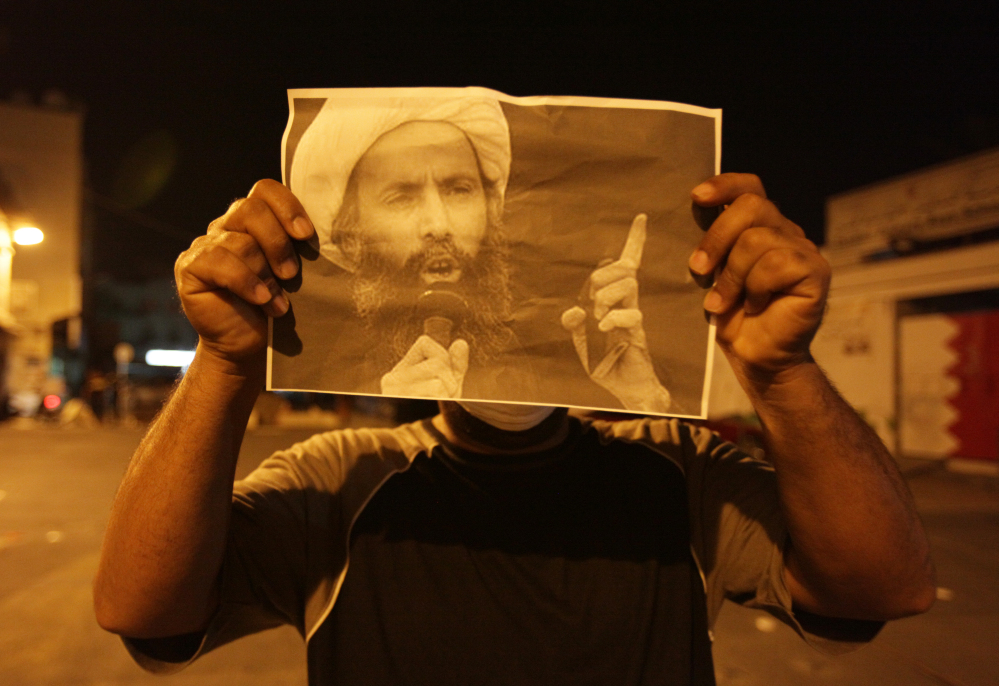RIYADH, Saudi Arabia — Saudi Arabia’s execution Saturday of 47 prisoners, including an influential Shiite cleric, threatened to further damage Sunni-Shiite relations in a regional struggle playing out across the Middle East between the kingdom and its regional foe Iran.
Shiite leaders across the region condemned Riyadh and warned of sectarian backlash as Saudi Arabia insisted the executions were part of a justified war on terrorism. Also executed Saturday were al-Qaida detainees who were convicted of launching attacks against foreigners and security forces a decade ago.
The execution of Sheikh Nimr al-Nimr now becomes another focal point for sectarian and political wrangling between Saudi Arabia and Iran. The two regional rivals back opposing sides in civil wars in Yemen and in Syria. Saudi Arabia was also a vocal critic of the Iranian agreement with world powers that ends economic sanctions in exchange for limits on the Iranian nuclear program.
Iranian politicians warned that the Saudi monarchy would pay a heavy price for the death of al-Nimr. The Iranian Foreign Ministry summoned the Saudi envoy in Tehran to protest.
The Saudi Foreign Ministry later said it had summoned Iran’s envoy to the kingdom to protest the critical Iranian reaction to the sheikh’s execution.
Al-Nimr’s execution could also antagonize the Shiite-led government in Iraq, which has close relations with Tehran.
Iraqi Prime Minister Haidar al-Aabadi Tweeted Saturday night that he was “shocked and saddened” by al-Nimr’s execution, adding that, “peaceful opposition is a fundamental right. Repression does not last.”
Hundreds of al-Nimr’s supporters protested in his hometown of al-Qatif in eastern Saudi Arabia, in neighboring Bahrain where police fired tear gas and bird shot, and as far away as northern India.
The sheikh’s brother, Mohammed al-Nimr, said that Saudi authorities said they had already buried the body, but didn’t tell him where. The family had hoped to bury his body in his hometown. His funeral would likely have attracted thousands of supporters, including large numbers of protesters.
State Department spokesman John Kirby said in a statement that the U.S. is “particularly concerned” that al-Nimr’s execution risked “exacerbating sectarian tensions at a time when they urgently need to be reduced.”
Al-Nimr’s death comes 11 months after Saudi Arabia issued a sweeping counterterrorism law after Arab Spring protests shook the region in 2011. The law codified that the kingdom could prosecute as a terrorist anyone who demands reform, exposes corruption or otherwise engages in dissent or violence against the government.
Send questions/comments to the editors.



Success. Please wait for the page to reload. If the page does not reload within 5 seconds, please refresh the page.
Enter your email and password to access comments.
Hi, to comment on stories you must . This profile is in addition to your subscription and website login.
Already have a commenting profile? .
Invalid username/password.
Please check your email to confirm and complete your registration.
Only subscribers are eligible to post comments. Please subscribe or login first for digital access. Here’s why.
Use the form below to reset your password. When you've submitted your account email, we will send an email with a reset code.